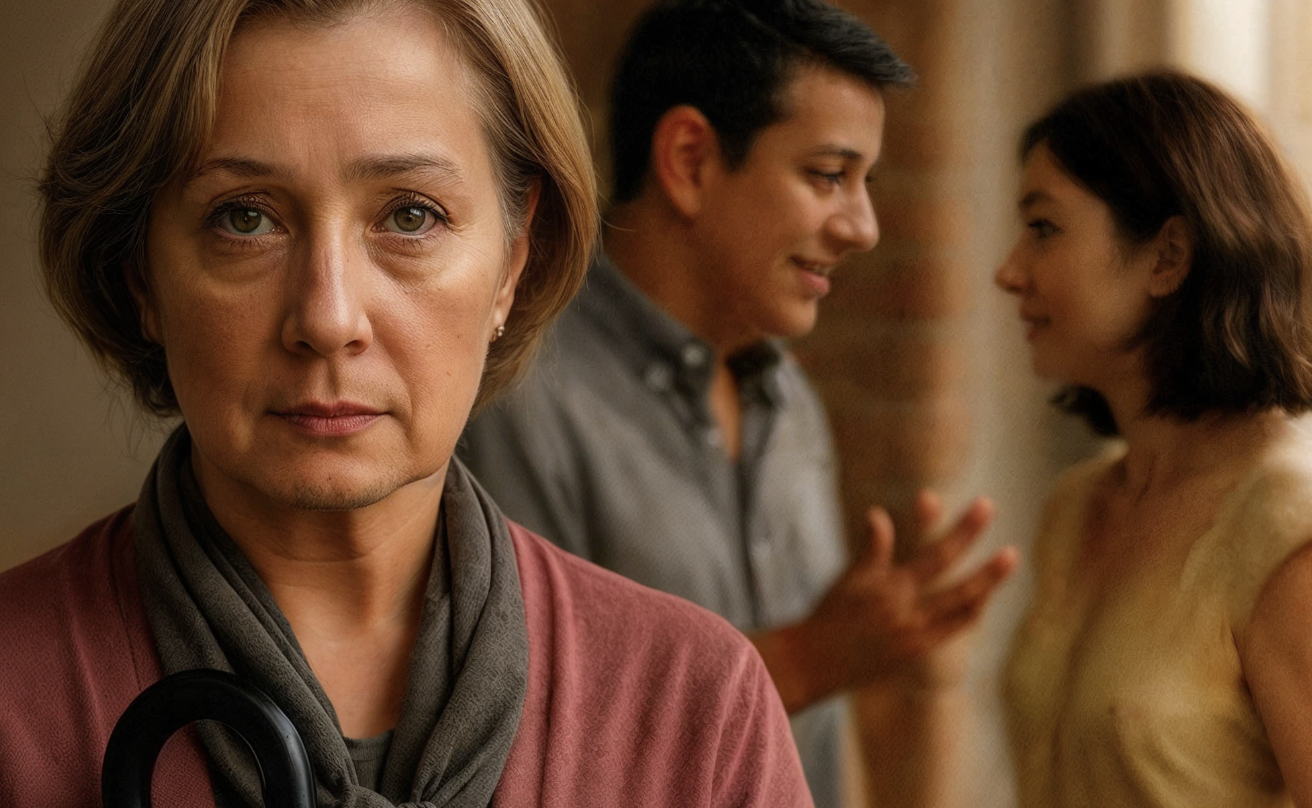— “She’s gotten on my nerves. She’s put on weight, she’s always unhappy about something. I don’t know why I put up with it.”
I heard my husband’s voice from the living room when I came back for my umbrella.
The truth overheard by chance
I froze in the hallway. The key was still in my hand. Rain drummed on the awning.
“Well, you chose her,” laughed Lenka, his sister. “She could at least take care of herself.”
“Take care… She should stop whining.”
I stood at my own apartment door and listened as the man I’d lived with for nineteen years listed my shortcomings.
Drops fell from the umbrella onto the tile.
I didn’t go in. I turned around and went back out into the rain.
Only then did I understand: I was going to get soaked anyway. But not by the rain.
In the rain
I walked along the boulevard without feeling the water filling my shoes. That conversation kept replaying in my head. Again and again. Vova’s voice—mocking, tired. Lenka’s laughter.
“Put on weight.” Yes, I’d gained some in recent years. But is that a reason for ridicule? We both got older. He’s got a belly now, his hair has thinned. I never discussed that with my friends.
“Always unhappy.” When did I complain? When did I ask for anything to change? I kept quiet. Cooked. Did laundry. Worked. Was convenient.
“I don’t know why I put up with it.” That’s the main thing.
So he puts up with me. I’m a burden. Nineteen years of marriage—for him, it’s endurance.
I stopped by a bench. Sat down. The rain was pouring down in sheets. People hurried by with umbrellas, glancing back. Some odd woman sitting in a downpour.
And I thought: what do I do now?
I could go back. Make a scene. Shout. Smash plates. Demand explanations.
And then what? They’d say, “You were eavesdropping? You’re paranoid. We were joking. You turned it into a tragedy.”
I’d become that hysterical woman Vova talked about.
No.
If I do anything, it’ll be different. Quiet. Calculated. No yelling.
I got up from the bench. Water streamed from my hair onto my shoulders. It didn’t matter. I’m wet—I’ll dry.
I went home.
A mask of calm
They were sitting in the kitchen when I walked in. Drinking tea. Lenka was saying something, Vova nodding.
An ordinary scene. Only now I knew what they talked about when I wasn’t there.
“Where were you?” Vova looked up.
“Out walking.”
“In the rain?” Lenka’s eyes bulged.
“I felt like it.”
I walked past them into the bathroom. Took off my wet clothes. Wrapped myself in a robe. Looked at myself in the mirror.
An ordinary face. Tired. A fifty-two-year-old woman. Not a beauty, not a monster. Just a woman.
“Put on weight.” So what? I had a child. I worked. I lived. Bodies change—that’s normal.
I went back to the kitchen. They were silent. Staring at me like I was crazy.
“Tea?” Vova asked awkwardly.
“I don’t want any.”
“Sveta, you’re acting strange,” Lenka cut in.
“Really?”
“Well, yes. You got soaked, you’re not talking…”
“I’m just tired.”
I went to the bedroom. Closed the door. Sat on the bed.
Three days of silence
For three days I moved like I was sleepwalking. Made breakfast. Cleaned the apartment. Answered questions in monosyllables.
Vova asked, “Are you sure you’re okay?”
I nodded. “Yes.”
And I thought. I weighed my options.
Forgive? Pretend I hadn’t heard? Talk to him?
And every time I came back to that line: “I don’t know why I put up with it.”
He endures me. Nineteen years. Discusses me with his sister. Laughs at me.
On the fourth day I knew: no. Enough.
I took out my phone. Typed into search: “divorce lawyer.”
Two dozen firms popped up. I read reviews. Looked for those who specialize in division of property.
I found a woman. Sixty years old, thirty-seven years of experience, lots of gratitude. “Helped divide the apartment,” “Restored justice,” “A competent specialist.”
I clicked the appointment form. Filled it out: name, phone, the issue. Wrote briefly: “Divorce. Division of property. Consultation.”
Sent it.
I lay down on the bed. Stared at the ceiling. Voices came from beyond the door—Vova and Lenka were sitting there again.
What were they talking about? Me? Discussing my strange behavior?
Let them. Soon they’d have something real to discuss.
The lawyer, Raisa Petrovna
In the morning the lawyer replied. “I’ve scheduled you for Wednesday at 16:00. Address attached. Bring your passport, marriage certificate, and apartment documents, if you have them.”
Wednesday. The day after tomorrow.
Vova went to work. I stayed home—I’d gotten the day off. I took all the documents out of the closet.
Marriage certificate—red cover, scuffed. Nineteen years ago we signed. I wore a white dress, he a suit. We smiled. It seemed forever.
“I don’t know why I put up with it.”
I photographed the certificate with my phone. The apartment documents too. Uploaded the files to the cloud. Backed them up to a flash drive—just in case.
Wednesday came quickly. I told Vova I was going to a friend’s.
He nodded without looking up. Scrolling on his phone.
“When will you be back?”
“By evening.”
“Okay.”
He didn’t even ask which friend. He wasn’t interested.
The lawyer’s office turned out to be in a regular apartment building. Third floor, a door with a plaque: “Family Law Consultations.”
I rang. A woman in a strict suit opened. Gray hair in a bun. Tired eyes. But a sharp gaze.
“Svetlana?”
“Yes.”
“Come in. I’m Raisa Petrovna.”
A small office. A desk, two chairs, a cabinet with folders. The window looked out on a courtyard. It smelled of coffee and paper.
“Sit down. Tell me.”
I told her. Briefly.
Came back for the umbrella. Heard the conversation. My husband and his sister were discussing me. He said I’d put on weight, that I whine, that he doesn’t know why he puts up with me.
Raisa Petrovna listened without interrupting. Jotted things down.
“How long married?”
“Nineteen years.”
“Children?”
“A son. Twenty-six. Lives separately.”
“The apartment?”
“In my husband’s name. We bought it during the marriage twelve years ago.”
“Then half is yours by law. Savings?”
“Yes.”
“Approximately how much?”
I named the sum.
“Open an account. At a different branch. But don’t transfer anything from the joint accounts yet—they could accuse you of hiding assets. Just document the balance. Get a statement. Photograph it. Save it.”
She spoke calmly. Businesslike.
“Make copies of all documents—marriage certificate, property records, bank statements. Hide them with someone. A friend, for example.”
“Why?”
“So he can’t destroy them if he guesses. Men can be vindictive when it comes to money.”
“And be ready to file suddenly.”
“Suddenly?”
“So he doesn’t have time to prepare. Surprise is your main trump card. While he’s in shock, you act precisely.”
“What if he starts begging?”
“Don’t give in. If you’ve decided—go to the end. Doubts ruin everything. He’ll see your weakness and use it.”
Raisa Petrovna slid a piece of paper toward me.
“Here’s a list of what to gather. Here’s my phone number. When you’re ready, call. We’ll file the petition. After that it’s just procedure.”
I took the paper. Looked at it. Items: documents, accounts, proof of joint property.
“Thank you.”
“You’re welcome. I hear stories like this every day. You know what I’ll tell you?
You’re doing the right thing. If a person doesn’t value you, why stay with them?”
I left a different person.
Not a victim. A strategist.
A month and a half behind the mask
For the next month and a half I lived like an actress.
In the mornings I woke up next to my husband. Made breakfast. Asked how work was. Watched TV in the evenings.
But inside everything had changed.
I watched. Noticed what I hadn’t seen before.
How Vova rolls his eyes when I speak. How, when Lenka comes over, she walks through the apartment—looking around, touching things. Calculating what her brother will get.
I used to think she was just curious. Now I understood: she’d always been jealous. Of our apartment, our life.
They exchanged glances when I left the room.
And I kept quiet. Collected documents.
I opened an account in another branch. Got statements from the joint accounts. Photographed the purchase agreement for the apartment. Sent all the files to my friend Marina.
“What happened?” she asked.
“I’ll tell you later. Just keep them for me, please.”
Marina didn’t pry. She’s smart. She understood.
One evening Vova asked:
“Sveta, a button came off my shirt. Will you sew it on?”
Before, I would have rolled my eyes. Said, “Can’t you do it yourself?”
But now—why bother?
“Give it here.”
I took a needle. Thread. Sewed the button on. Even. Tight. Neat.
Vova stared at his phone. Didn’t even look up.
I thought: that’s the last time I take care of his shirts. I won’t have to anymore.
And I felt lighter.
At dinner he asked:
“Sveta, why are you so quiet lately?”
“Tired.”
“Here we go again with the complaining?”
Before, I would have protested. Said I wasn’t complaining, just sharing.
But now—why?
“No. I won’t.”
I finished eating. Cleared the table. Went to the bedroom.
I heard him call Lenka. Whispering, but I caught it:
“I don’t know what’s with her. She’s gotten weird. Quiet all the time.”
Too late to worry.
Filing the papers
A month and a half after my consultation with Raisa Petrovna, I was ready.
Statements obtained. Documents copied. Plan laid out.
I called the lawyer.
“Raisa Petrovna, I’m ready.”
“Come tomorrow. We’ll prepare the petition.”
The next day I signed the papers. Raisa Petrovna explained everything: how the court would proceed, what to say, what to expect.
“The apartment is split in half. You can insist that he buy out your share. Or sell everything and split the money. Your choice.”
“I want him to buy me out. I don’t want the hassle of selling.”
“Good. We’ll state that in the petition.”
She typed up the document. Handed it to me.
“Sign here. We’ll file in court tomorrow. He’ll receive the summons in about a week. The hearing will likely be set for about two months from now.”
I signed.
The letters on the page—straight, crisp. “I request the dissolution of marriage. To divide jointly acquired property.”
Nineteen years reduced to three lines.
The reveal
The summons came to Vova’s workplace. He came home pale. Paper in hand. A blank look on his face.
“What is this supposed to mean?!” He flung the summons onto the table.
I was sitting in the kitchen. Drinking tea. Calm.
“A divorce, Vova. We’re getting divorced.”
“Out of nowhere?! At least explain!”
I set down my cup. Looked at him.
“I came back for my umbrella. I heard you talking about me with Lenka.”
He froze. His face turned gray.
“Sveta, that’s… That’s not what we meant…”
“You meant it. You said I’d put on weight. That I whine. That you don’t know why you put up with me. I decided not to make you put up with me.”
“But we were just… chatting! Not seriously!”
“For me—it’s serious.”
He tried to come closer. To take my hand. I pulled away.
“Sveta, understand. It was a meaningless conversation. Nonsense. I love you.”
“Really? Then why tell Lenka you put up with me?”
“I chose the wrong words…”
“You chose very precise ones. The lawyer has already filed everything. The papers are in. The apartment is split in half. The accounts too. You can buy out my share or we’ll sell and split the money.”
“Are you out of your mind?! What will you do?!”
“I’ll rent an apartment. Or buy a small one with my share. Not your concern.”
“But we’ve been together so many years!”
“Nineteen. I remember. And all nineteen, it turns out, you were putting up with me.”
He sat at the table. Clutched his head.
“I’m an idiot. Forgive me.”
“I forgive you. But I’m not going back.”
“Sveta…”
“That’s it, Vova. The decision is made.”
I stood up. Went to the bedroom. Closed the door.
I heard him call Lenka. His voice breaking: “She’s filing for divorce! Because of that conversation!”
Lenka was yelling something into the phone.
But I didn’t care.
Support from my son
In the evening I called my son. Danil sensed it right away.
“Mom, did something happen?”
“I’m divorcing your father.”
Silence. Long. Then quietly:
“Because of what?”
I told him briefly. The umbrella. The overheard conversation. His father’s words.
“I see,” Danil sighed. “Mom, I’m on your side. Do what you think is right. If you need help—say the word.”
“Thank you, honey.”
“He’s a fool. He didn’t appreciate you. It’s his fault.”
I hung up and cried. For the first time in all those weeks.
Not from pain—from relief.
My son understood. Supported me. Didn’t pry. He’d grown up.
Starting anew
The hearing took place two months later. The property was divided. Vova bought out my share—his parents helped with the money. He didn’t want to sell the apartment.
I rented a studio. Small, cozy. On the fifth floor of an old building. Windows to the courtyard. Quiet.
I changed jobs—became an administrator at an optician’s. Convenient hours, decent pay. All women on staff, friendly.
I lived alone.
And for the first time in many years, I felt calm.
A year later
I ran into Vova by chance. A year after the divorce.
I was standing at a bus stop when he stepped off a minibus. He saw me. Hesitated. Came over.
“Hi.”
“Hello.”
Silence. He looked at me. I looked at him.
He was slumped. Confused eyes. A pale band on his finger where the wedding ring had been. So he’d taken it off.
“How are you?”
“Fine.”
“I… Sveta, maybe we could talk?”
“About what, Vova?”
“I didn’t think you’d react like that. We were together so many years…”
“Nineteen. I remember. Do you remember what you said to Lenka?”
He swallowed.
“I was stupid. I’m sorry.”
“I forgive you. But I’m not going back.”
I looked at him calmly.
“You know, I realized something. It’s better to live alone than next to someone who thinks you’re a burden.”
“I didn’t think…”
“You did. You endured me. Discussed me with your sister. And I want to be where I’m valued. Or at least not talked about behind my back.”
The minibus pulled up. I stepped to the door.
“Take care, Vova.”
I got on. Looked out the window.
He stood at the stop. Small. Older. Alone.
And I rode home. To my apartment. To my life.
Finale
Evening. I sat by the window. Rain had started—the first autumn rain. It traced thin streams down the glass.
I never did take that umbrella that day. I got soaked.
But I realized this: there are some downpours you don’t hide from. You leave them.
And when you leave, you understand the umbrella was never for the rain. It was for other people’s words


